A SON OF THE CHURCH
V. The humiliation of God
and the patience of saints
(1983-1987)
IN November 1970, (...) our Father assigned three causes to « the terrible disintegration of the Church ». The first was modernism « a doctrine and a party that Saint Pius X denounced and condemned; the second one was « the criminal complicity that the Pope and the bishops concede to the modernist sect ». Finally, « the third cause of the ills from which the Church suffers is the lack of holiness in the Christian people (...) ».
« This is why, after having denounced the modernists’ enterprises and the complicity of the Pope and the bishops, we must put the blame on ourselves, men and women religious, priests and faithful, for not being saints, or for not having merited by our prayers, our works of penance and mercy, our good conduct, that God create a saving reaction among us. »
I. PONTIFICAL MODERNISM, THE HUMILIATION OF GOD
Since the accession of John Paul II, the first two causes of « the terrible disintegration of the Church » are one and the same. (...)
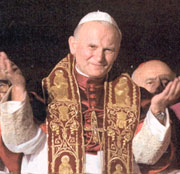 By attentively studying the life of Karol Wojtyla, his ideas and his theology, our Father demonstrated that throughout his life, he had devoted himself to this intellectual creation of a humanist, Christian dialectic, to its implementation in a revolutionary pastoral approach that earned him his elevation to the sovereign pontificate, from which he teaches his secular humanism, and promotes its realisation in all spheres and at all levels of the Church. (...)
By attentively studying the life of Karol Wojtyla, his ideas and his theology, our Father demonstrated that throughout his life, he had devoted himself to this intellectual creation of a humanist, Christian dialectic, to its implementation in a revolutionary pastoral approach that earned him his elevation to the sovereign pontificate, from which he teaches his secular humanism, and promotes its realisation in all spheres and at all levels of the Church. (...)
Pope John Paul II teaches something quite different than « this wonderful interrelationship between divinity and humanity, which begins on this earth and reaches its fullness in Eternal Life. » For the full and exclusive adoration of God, our Creator and our Father, for the adherence of faith and love given to the Word, Son of God made man, our Lord and our Saviour, Pope John Paul II substitutes worship of man. He said so himself in France in 1980. Quoting it is enough to be appalled by it.
« The fundamental dimension capable of revolutionising the systems that provide the structure for all mankind and of freeing human existence, both individual and collective, from the threats hanging over it, is man, man in his wholeness, man whose life partakes of both material and spiritual values. Respect for man’s inalienable rights is at the basis of everything.
« This man is unique, complete and indivisible. In the cultural domain, man is always the primary factor: man is the primordial and fundamental factor of culture... In thinking of all cultures, I wish to say here in Paris, at the seat of UNESCO, with respect and admiration, “Behold the man!” » (Book of Accusation II, p. 89)
These are the words of Pilate presenting Jesus to the crowd after having had Him scourged. Thus in the humanism of John Paul II, man « unique, complete and indivisible » has taken the place of God, Father, Son and Holy Spirit, according to a philosophy condemned by Saint Pius X in the encyclical Pascendi Dominici gregis. (...)
For, « the first hydra head of Satan’s that Saint Pius X undertook to vanquish was precisely that of the agnostic philosopher. (...)
Now the philosophy of Karol Wojtyla « is indistinguishable from modern humanist philosophy. ». For John Paul II professes to « meet “ man who makes himself God”, not as Paul VI did out of goodness or flattery, but through an intimate identity of philosophical concepts with those of modern atheist thinkers and through approval for their most surprising and audacious dialectic. »
John Paul II declared to André Frossard: « We would find it difficult to live in a “pre-Copernicus”, a “pre-Einstein”, or even a “pre-Kant” world. »
Before Kant, all European science instinctively obeyed the first principle of scholastic philosophy, according to which man draws all his ideas, and therefore his judgements and his science, from knowledge of the visible universe. (...) Kant reverses the roles by declaring that the science of man is the reflection of his own intelligence and not the reflection of things… and of the intelligence of God Who created them. (...)
Up until the Second Vatican Council, the Catholic Church firmly refused this transferral from the objective world and from the divine Being to man, to this « generalised relativity » by virtue of which the only absolute principle is that everything is relative to man.
The entire second Book of Accusation is a terrifying demonstration (...) of the tremendous heresy of John Paul II, « a philosopher Pope », steeped in Kantian philosophy. It is more than a heresy; it is an apostasy in three phases, a diabolical parody of the three historical stages of the mystery of Redemption:
1 A Speculative Good Friday, the fruit of a philosophy that leads to the annihilation of religion. In place of “obsessive” theocentrism, Pope John Paul II continually substitutes a conscious and deliberate anthropocentrism, the very one that is proper to atheists, agnostics, Hegelians and Marxists among whom, according to him. (...)
« This "speculative Good Friday" will take years to translate itself into the reform of the Christian life, its customs of piety and ultimately beliefs, a reform that must end in their total dissolution, their natural death. The process was started at the Council and is well advanced. »
2 A Dialectical Holy Saturday: on the day following this deicidal Good Friday, John Paul II decided to meet the “assassins of the faith” and to go down into Hell there to dialogue with them. (...) It is the confrontation of atheistic humanism with the Christian religion. (...)
3 An Idealist Pasch, or the emergence of “ another transcendence”, is not at all a return to the Old God, the Creator, (...) Saviour, Legislator, and Judge to come. All this “ theism ” has fallen beneath the blows of the atheism and agnosticism (...). It will not return.
It is therefore a new God that the “ faith ” of John Paul II reveals in man as he creates his own singular and sublime history: « A noumenal God for a phenomenal Pope ». The expression is a stroke of genius. It proves that Fr. de Nantes thoroughly penetrates the thought of John Paul II better than all his adorers and sycophants celebrating « an extraordinary Pope ».
Having rejected the “ theist God ” – the true God of our Catholic faith, the Legislator and Sovereign Judge of the living and the dead – for the sake of the God of conscience and of the future, who is full of admiration and love for man, the Pope preaches a lifeless, faceless, speechless God bereft of any consistent existence. It is a “ noumenon”, according to the expression of Emmanual Kant.
What remains? There remains nothing other than Kant’s morality, “ the categorical imperative ” of a moralising Pope.
Because John Paul II believes that he alone is the first to have achieved the « synthesis » that must dialectically result from the « contradictions » of the previous stages of the confrontation of Christianity and atheism, he says yes to the modern world and to its atheist philosophy, and at the same time yes to God, to the Church and to Mary! Through the « vital immanence » condemned by Saint Pius X – but what does this matter to him? – he seeks to re-establish and resuscitate in the deepest consciousness and the actual life of every human being, the religion that modernism excludes from historical and physical reality. (...)
The scandalous interreligious meeting of Assisi three years later in 1986 would confirm this analysis in an unqualified manner. For those who had perfectly understood the thought of John Paul II, there was nothing surprising in this: (...)
« Splendidly absent from the secular domains of natural philosophy or from sociology, the Modernist faith is, nevertheless, ever present as the spontaneous and universal creation of the deepest human feeling. Thus, it uses the dogmas and rites of the various religions as symbols and instruments of its innermost life, always seeking more perfect forms. »
II. THE PATIENCE OF SAINTS
Nevertheless, putting our trust in the Immaculate Heart of Mary, we await the resurrection, the true one! We await it after the “ speculative ” Good Friday and the “ dialectical ” Holy Saturday that has indeed led the Church to the tomb. (...)
THE GENIUS OF A DOCTOR OF THE CHURCH
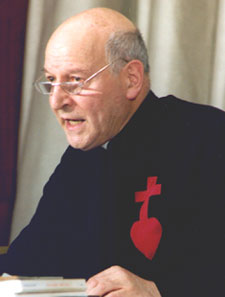 Fr. de Nantes did not content himself with merely criticising and accusing Pope John Paul II of having fallen under the censure of Saint Pius X. He positively renewed scientific apologetics beginning with an all-out refutation of Kantian philosophy and then went through the large spectrum of modern sciences: “ To finish with Einstein” in cosmology, with Monod in biology, with Darwin in biogenesis, with Konrad Lorenz, with Teilhard, with Freud, with Marx.
Fr. de Nantes did not content himself with merely criticising and accusing Pope John Paul II of having fallen under the censure of Saint Pius X. He positively renewed scientific apologetics beginning with an all-out refutation of Kantian philosophy and then went through the large spectrum of modern sciences: “ To finish with Einstein” in cosmology, with Monod in biology, with Darwin in biogenesis, with Konrad Lorenz, with Teilhard, with Freud, with Marx.
Here is the absolutely brilliant conclusion of this series of studies, one of which would have been enough to fill a lifetime: « It is because they are atheists that the science of modern humanists is mad, and necessarily so. » (...)
« Knowing how to safeguard reason… is some undertaking! In this task, one soon discovers with immense surprise how much even those scientists who are utterly honest and most rigorous in their observations and calculations can be inclined to the spiritualist dream, to the pantheist myth, as soon as these latter clothe themselves in borrowed scientific concepts.
« No, modern science is not pure, it is not free and it is not honest, much as it gives the appearance of being so. No, it is not science that through its sensational discoveries, its bold theories and Copernican revolutions has dismissed God as a useless notion. It is the negation of God that has violated reason, distorted the observation of phenomena and finally constrained science to abandon the normality of its concepts, to go off course and to set up so many fanciful constructions outside commonsense. Why? In order to do without the invisible. It is God Who is missing in science more than science is missing in God. » (CCR n° 148, July 1982, p. 10)
This shows that Karol Wojtyla has totally gone astray, from a scientific point of view as much as from one of philosophy and of the faith for a reason that is easy to understand:
« Divine revelation, whose depositaries we are, is not based on a scientific theory, nor does it come from any world system. It is of a different order. Certainly, science and religion are in man, in the world and in history, but that is practically their only meeting point. » (CCR n° 135, p. 6)
THE CHARITY OF A SON OF THE CHURCH
In the editorial quoted at the beginning, after having acknowledged that we have not yet merited « that God create a saving reaction among us », simply forgetting that our Father alone constituted one himself, and the CCR with him, our Father continued:
« (...) Let us work first towards our personal conversion and we shall be able to see the terrible situation of the Church in a new light. In our pride, we would be annoyed with our Bishops and our Pope – and with very good reason! We would be exasperated against the “assassins of the faith” and their whole retinue – and rightfully so! If, however, we despair of the Church in the belief that we no longer belong to her, we the last of the Just among all the others, this is when we would be guilty and this would be the means whereby we would participate in the universal error. Once we resolve to sanctify ourselves, we find ourselves in the barque, fraternally rowing with all the others, perhaps more than the others, but for our common salvation. Did not Our Lord say to us: “ In patience you shall win your souls”? » (CCR n° 10, p. 2) (...)
« The large mass of Catholics, who were lukewarm or mediocre beforehand, are falling into sin by blindly following the pastors who are corrupting them. A small number are sinning by setting themselves up as perfect instead of staying in the midst of the others and striving to become better themselves. Here we enter a spiritual battlefield where the play of light and shade is ever-changing – where good and evil fight against each other within individual souls who may easily be led astray by the Spirit of Evil disguised as an Angel of Light, tempting them towards a spurious state of greater perfection! » (...)
Our Father was sustained by this long patience and went to Rome three years later with seventy delegates of the League of the Catholic Counter-Reformation, to lodge a “ Book of Accusation” against Paul VI, and a second time in 1983 against John Paul II.
Even though his request for an audience addressed to the latter received no reply, our Father did not abandon “ the patience of saints ”. He wrote once more to the Holy Father without circumlocution.
« I am publicly accusing You of heresy, schism and scandal. How could You, through Your administration, evade an answer, justifying or accusing Yourself before Your people, before Your conscience and even before God?
« The strange popularity You enjoy, as vain as it is transitory, orchestrated and suspect though it be, has persuaded You and Your admirers that you are above all criticism as well as above all law. It is not true.
« There has to be someone to rise up in the holy Assembly to tell You these things. (...)
On Easter Sunday, April 3, 1983, our Father confided in our friends:
« For many years, heavens! almost twenty years, yes, twenty years! I have led this fight against the reform of the Church only in the light of our common Faith. (...) Faith, Faith alone sufficed for all of us as the foundation of this enterprise, to justify this combat, unique, it must be said, in the annals of the Church. Probably this time it is more terrible. Last autumn I was upset, not to use the big words like overwhelmed or crushed. Faith still sufficed, and I asked nothing of the Father to continue this work.
« I do not say that I had some vision or revelation – this is not the way God proceeds with me – but a grace that I cannot consider as being granted to me alone. (...)
« What then is this grace of the Holy Spirit that is active in our hearts? A peace, a joy, a force without human cause, constant, unvarying, impervious to the fluctuations of everyday life, to its complacencies, to its difficulties, to the favour or disfavour of the beings on whom everything hangs in the balance for us. It is also a communication of certainty: by following this line of action, we are doing what God wants. It is a supernatural certainty that exceeds human horizons to such an extent that it leaves the soul indifferent to life and to death even, to success, to glory, of course! or to failure, contempt and hatred, of course. I now know from God that the steps we have taken are useful to the Church, they are part of her history, they are an integral part of the mystery of the growth of the Reign of the Unique and Immaculate Heart of Jesus and Mary in the world, a growth that is becoming rapid in this century, but running counter to what is commonly believed and said about it. Contrary to it!
« Through this divine gift, (...) certain interior improvements have been easy for me, which is a sign for me alone, but above all the work that I direct is distinct from myself and this concerns you. God continues it through you! Through us. He conducts it according to His plans borne of His omnipotence and mercy, while we only have to let ourselves be conducted, led, influenced, our heart henceforth free of all fear, our imagination of all fright, our thought of all doubt, having no other inner occupation than pleasing Him, our soul, one to One with Him, and serving Him as well in our ordinary and insignificant works as in the enterprises that may seem gigantic with good reason, but that, from that moment on, no longer fall within our province but within His »
Ever since then, Fr. de Nantes has never lost this serenity.
Of course, he was not listened to anymore in 1983 than he was in 1973, « but the fact that we were neither heard nor condemned will also testify that the Church, in the silence of her sacred infallibility, recognised in us the witnesses to her indefectible Truth, and later, it will be in this silence and this secret maternal benevolence, that the Church’s unfailing fidelity to her only Spouse and Lord, Jesus Christ, will be recognised. » (...)
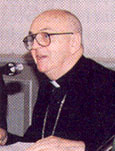 On May 13 1983, Msgr. Hamer said to our Father, while we were in his office at the Holy Office to deliver to him the Book of Accusation against John Paul II:
On May 13 1983, Msgr. Hamer said to our Father, while we were in his office at the Holy Office to deliver to him the Book of Accusation against John Paul II:
« Your errors, you know them very well.
– I do not know them. I ask you to show them to me precisely.
– It’s a waste of time. »
Our Father stood up and declared, in the presence of the five witnesses there, and pointing to the large crucifix hanging on the wall behind Msgr. Hamer:
« In the name of the Crucified Christ, in the name of my God Who will be our Judge, I say, your Excellency, that you are a liar. »
Then turning towards the secretary:
« Please note, Msgr. Jarry: “Your Excellency, you are a liar, a liar!” I have nothing further to add. »
And we left the parlour. (...)
III. THE APPEAL TO THE JUDGEMENT OF GOD
OR
DAVID’S THREE STONES AGAINST GOLIATH
Our Father could repeat what he had said about his accusations brought against Paul VI in speaking about those against John Paul II, that they were « justified because they were known to all and published in thousands of copies, had met with no theologian willing to debate them in public, no authority within the Church to make them the object of a dogmatic condemnation, in short no one to defend the Pope! »
Thus, foreseeing in 1983 that the authorities would repeat the dereliction of duty they committed in 1973, our Father envisaged as early as the month of April an ultimate recourse. (...)
« So, there remains for us the great, the ultimate means that is to appeal to the Omnipotence of the veritable and eternal Head and Pontiff of the Holy Church, and to invoke against a prevaricating Pope the Name of Jesus Christ, the just Judge of the living and the dead. » (...)
Our Father wrote to Cardinal Decourtray, Archbishop of Lyon, Primate of the Gauls, on August 25, 1986, on the twentieth anniversary of his suspension.
« Am I wrong? Are we wrong, all those of us who remain the witnesses of yesterday and of the day before yesterday, against the Church of the Council and of the post Council? (...) Why do you not say so with the full force of the divine authority conferred on you by your high office, in order to end this division and bring us back into the unity of the Roman, Apostolic and Catholic faith? » (...)
Our Father specified that he was asking the Pope to pronounce the following anathema: « If anyone says that social liberty in matters of religion is a natural human right, let him be anathema! » Then he continued.
« (...) Today is the time for the Truth to be declared and lived before the time comes when Justice is heard and suffered. Once again, Eminence, persuade the Most Holy Father to speak as the infallible and invincible Doctor of the Catholic faith and we shall kiss the hands of your Grandeur with feelings of the keenest gratitude. » (...)
The Cardinal replied that he found it « hard to believe that such an act would have the expected effect. I shall, however, transmit your letter to the Holy See. »
Did he do so? No one knows. There was total silence from the Vatican.
Then like David, our Father took a second “stone” from his shepherd’s bag and slung it at Mgr Vilnet, the President of the Conference of French Bishops, on October 11, 1986, the anniversary of the opening of the Second Vatican Council: (...)
« Your Excellency, I therefore invite all of you and challenge you to clear yourselves of our accusations, and if you are able, to confound your accusers, publicly, in a debate with no consideration shown to anyone, having no other intention than the manifestation of the truth. You say that it is in your possession? Show that it is so, prove it!
There followed a detailed proposition of possible encounters, « a debate on national television. » or at our « annual meeting of La Contre-Réforme Catholique in the main hall of the Mutualité in Paris » it matters little! Provided that the truth of the Holy Spirit be manifested after a fair duel « of immense consequence » as has often been the case in the Church's history. (...)
Msgr. Vilnet played dead, but the Bishops of France, on the sly, asked a Jesuit, Fr. Sesboüé, to present them a study on: « “ Is the doctrine of religious liberty contrary to Christian revelation and to the Church’s tradition?” »
Upon learning this, our Father wrote:
« One needs to be born a Jesuit or become one to execute such a command! (...) So plainly is “ the doctrine of religious liberty” Masonic in its origins and essence – “ contrary to Christian revelation and Catholic tradition” that the Jesuit was only asked to win the bet on a half-lie. At least, let him succeed in proving that it is not contrary and that in itself would be fine. For it was awkward to ask Father Sesboüé to establish that religious liberty derives, as water from the source, from holy Scripture and Tradition. That would be truly impossible! »
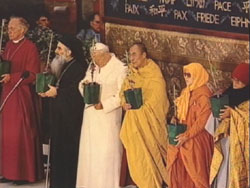
October 27, 1986.
There remained the third stone to sling by writing to Cardinal Lustiger on November 11, 1986. In the meantime there had taken place the implementation of the “dogma” of religious freedom, this « black day of this October 27 on which the Pope had assembled the major religions for peace at Assisi! »
« I see that nothing remains to us other than the direct and immediate appeal to God’s judgement […] with you. Yes, your Eminence! With you… » Then he proposed that in the year that run from December 8, 1986 to December 8, 1987, « he who errs be struck by God with death, and that the other be spared. »
With, as champions for the ordeal:
« As upholder of the unchanging Roman Catholic faith, and rejecting its recent Conciliar and pontifical contradiction, I, Georges de Nantes, priest of the holy Church.
« As guarantor of the new doctrine of religious freedom considered as a natural right of man in society, and consequently of all the other novelties of the decrees and declarations of the Council relative to ecumenism, non-Christian religions, openness to the world, Your Eminence, Jean-Marie Cardinal Lustiger. (...) »
In return, our Father received no acknowledgement of receipt other than that of the post office… This amounts, for Lustiger’s part, to declaring himself defeated.
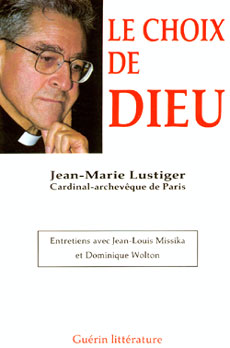 Moreover, far from appealing to God, He claimed to be able to pass sentence in a book published three days before the expiration of this “year of the faith”, entitledGod’s Choice. It was the Lord’s answer.
Moreover, far from appealing to God, He claimed to be able to pass sentence in a book published three days before the expiration of this “year of the faith”, entitledGod’s Choice. It was the Lord’s answer.
« I would never have supposed what I have just learned from a good source: that Cardinal Lustiger was very concerned about my ordeal and took the initiative so as to have the upper hand. He worked hard all year to have ready for publication, substituting himself for the Judge, the Lord’s Answer – yes, yes! – “ God’s Choice” just in time for it to burst into the press and on television for the December 8! I am the one whom God has chosen, he says, and de Nantes is excluded. (...) »
And for good measure, at the Wednesday audience on December 9 Pope John Paul II condemned, with a casual air, Fr. de Nantes, saying: « Jesus never works a miracle to punish someone, even when guilty; He refuses to do so for His glory or in His own defence. » (...)
Commenting on this speech of the Pope that condemned him in veiled terms, our Father wondered whether we should understand that John Paul II was condemning « the harshness of St. Peter – or rather God Himself, of Jesus Christ deciding their death! – towards Ananias and Saphira (Ac 5), that of St. Paul towards Elymas the magician (Ac 13) and against the incestuous adulterer of Corinth whom he“delivered to Satan” with the support of the whole assembly of the faithful and “with the power of our Lord Jesus” (1 Co 5), not to mention incessant and countless bodily and not spiritual ordeals and anathemas? »
In this case, « beyond doubt, John Paul II’s allocution of 9 December constitutes either a new revelation concerning the truth of Jesus or the revelation of a new Jesus who is not that of history and of ecclesiastical tradition. In either case, the Catholic faith is violated and adulterated by John Paul II, and for us it is yet another answer from our Lord provoking our adversary to reveal his fundamental anti-Christianity for our great hurt. »
CONCLUSION: PATIENCE...
« So, nothing is finished. God Himself sends us back to our fight. Once again He has allowed our adversaries to speak, act and triumph. »
« And since then, it is naked faith. I mean: it is the simple intellectual act whereby each person sees the opposition between the Credo and the new religion that the authorities of the Church substitute for it, which makes us cling to the CRC (…).
« It is therefore absolutely clear to me that God Almighty did not want to respond to my, to our Appeal, because He is already too obviously insulted, blasphemed, and His Holy Mother as well, to feel inclined to give supererogatory signs to this “ evil and adulterous generation”. » (...)
Brother Bruno of Jesus
Taken from He is Risen! n° 27, November 2004